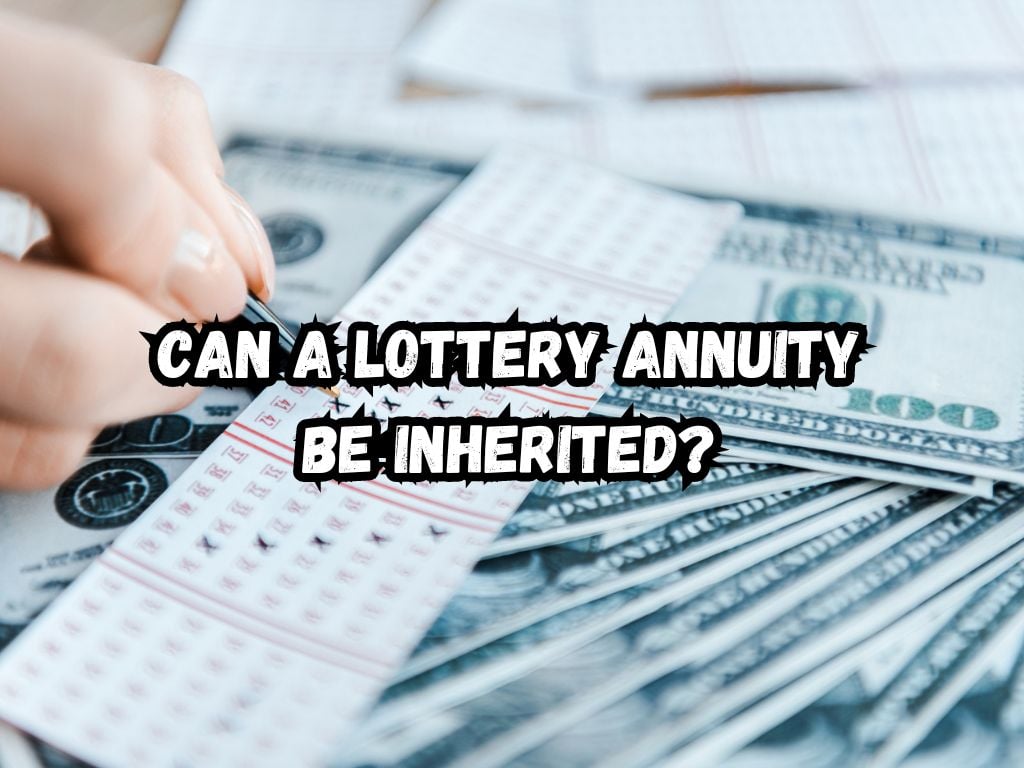Navigating the unexpected path of inheriting a lottery annuity can seem like navigating through a maze with no clear exit.
This guide aims to shed light on the process, simplifying complex terminologies and regulations, to help you understand your rights and responsibilities should you find yourself the heir to a lottery annuity.
Can a Lottery Annuity be Inherited?
Absolutely, a lottery annuity can be inherited. When the holder of a lottery prize with an annuity installment plan passes away, the remaining installment payments can be collected by the legal heirs or beneficiaries.
However, the specific laws and rules governing the inheritance of such lottery prizes can vary from one jurisdiction to another and should be interpreted in accordance with applicable laws.
Moreover, the inherited installments remain taxable. It’s always advisable to consult with a qualified attorney or financial advisor in these circumstances to understand the implications and procedures involved, and ensure the inheritance is managed in compliance with the law. Utilize professional assistance to navigate the legal and tax implications efficiently.

Understanding Lottery Annuities
Lottery annuities are long-term payments that a lottery winner can choose instead of a lump-sum payout.
Opting for an annuity means the winner receives smaller, guaranteed payments spread out over several years, often 25 to 30, which can have significant tax benefits and provide a steady income stream.
The Path to Inheriting a Lottery Annuity
Inheriting a lottery annuity involves several steps, starting from the notification of the original annuitant’s passing to the transfer of annuity payments to the beneficiary.
The specific process can vary based on the state the lottery was won in and the terms laid out by the lottery commission. Generally, the heir would need to provide a death certificate and legal documentation proving their right to inherit the annuity.
Rules and Regulations
The rules surrounding the inheritance of lottery annuities are mostly straightforward but can differ slightly depending on the issuing state.
Commonly, the lottery commission requires the annuity to continue its payment schedule to the designated beneficiary rather than offering a lump-sum payout option.
Tax Implications for Heirs
Heirs should prepare for the tax implications of inheriting a lottery annuity. While the estate tax may not apply if the estate’s value is below federal tax thresholds, income tax on the annual annuity payments remains unavoidable.
The tax burden can vary significantly, so it proves vital to understand ahead of time how much of the annuity will be taxed as income.
Special Circumstances
Inheriting a lottery annuity as a non-family member is a less common scenario that brings its own set of challenges. The process is fundamentally the same, but additional scrutiny might be applied to ensure the transfer is legitimate.
Furthermore, if the original annuitant has not yet received all payments, the remaining amount will be passed to the heir under the original terms, barring any state-specific rules.
Professional Guidance
Navigating the intricate details of inheriting a lottery annuity is not a journey you should embark on alone. Seeking advice from financial and legal professionals can provide clarity and assistance, ensuring that the inheritance process goes as smoothly as possible.
They can help you understand the specific state laws that will apply to your situation and the most tax-efficient way to manage the inherited annuity.

Frequently Asked Questions
Can a lottery annuity be transferred to another person?
Yes, a lottery annuity can be transferred to another person if the original winner has designated them as a beneficiary or through legal means such as a will. It cannot be transferred for the winner’s benefit while they are alive, outside of specific structured settlements.
What happens to the annuity if the winner dies prematurely?
If the lottery winner dies before receiving all annuity payments, the remainder of the payments is passed to their beneficiary as established by the winner’s will or by the state’s default succession laws if no beneficiary is named.
Are non-family members eligible to inherit a lottery annuity?
Absolutely. The winner’s beneficiary can be anyone designated by them, regardless of familial relation. The process for inheriting the annuity remains the same.
Conclusion
Inheriting a lottery annuity is a unique and complex process that requires careful navigation and understanding. While it comes with its set of challenges, proper knowledge and preparation can transform what seems like a daunting task into a manageable one.
By familiarizing yourself with the rules, understanding the tax implications, and seeking professional guidance, you can ensure that you fulfill your responsibilities as an heir while benefiting from your newfound financial asset.
Remember, while the prospect of inheriting a lottery annuity may seem overwhelming, it brings both financial benefits and responsibilities.
Empower yourself with knowledge and the right professional support to make the most of this unique legacy.


 Tags:
Tags:










